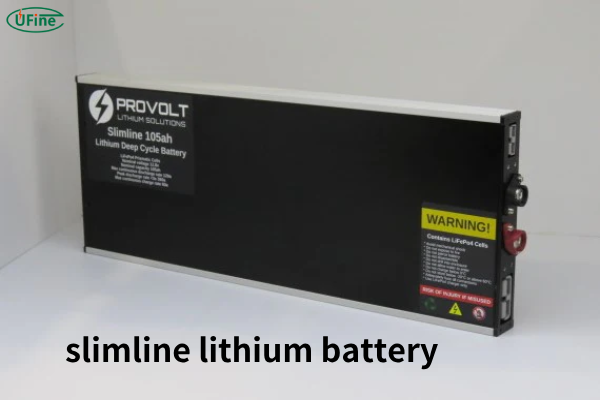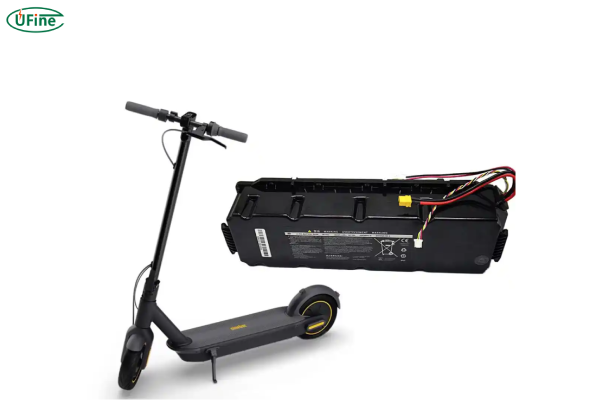When it comes to reliable, long-lasting, and efficient power storage, slimline lithium batteries have become a game-changer. Whether you’re a camper, a solar enthusiast, or just looking for a battery to power your electric vehicle, these sleek and powerful batteries are transforming the way we use energy. In this article, we’ll dive deep into everything you need to know about slimline lithium batteries—what they are, how they work, their voltage and capacity options, and the best ways to choose one for your needs.
Part 1. What is a slimline lithium battery?

At its core, a slimline lithium battery is a type of rechargeable battery designed with a slim, compact form factor. But there’s more to it than just size. These batteries are typically made using lithium-ion (Li-ion) or lithium iron phosphate (LiFePO4) chemistry, both of which offer significant advantages over traditional lead-acid batteries.
So, what makes them stand out?
- Energy Density: Slimline lithium batteries pack a huge amount of energy into a small, lightweight package. This makes them ideal for devices and applications that need a lot of power in a limited space.
- Longer Lifespan: Compared to other types of batteries, slimline lithium batteries can last up to 10 times longer. They typically provide 2,000 to 5,000 charge cycles, making them a long-term investment.
- Lightweight: These batteries are significantly lighter than lead-acid batteries, which makes them easier to transport and install—especially important for mobile applications like RVs or electric bikes.
- Faster Charging: Lithium batteries can charge much quicker than traditional lead-acid batteries. Depending on the model, a lithium battery can recharge up to 5 times faster, saving you time and effort.
In short, slimline lithium batteries combine cutting-edge technology with practical benefits—making them an excellent choice for anyone who needs efficient, durable power storage.
Part 2. Slimline lithium battery voltage
The voltage of a lithium battery determines how much power it can deliver to your device or system. When it comes to slimline lithium batteries, you’ll typically encounter the following voltage options:
- 3.2V: This is the voltage of a single cell in a lithium-ion battery. If you’re working with a system that uses multiple cells, like in large solar setups or electric vehicles, these cells are connected in series to achieve the required voltage.
- 12V: One of the most common voltage options for slimline lithium batteries. This is typically used in smaller devices, such as backup power systems, off-grid solar power setups, RVs, and electric scooters.
- 24V: For medium-sized systems that require more power, like larger solar installations or electric vehicles.
- 48V: Popular in high-power systems, including electric buses, large solar setups, and industrial applications.
Choosing the right voltage is crucial. Too high or too low a voltage could lead to inefficient operation or even damage to your devices. Generally, you want to select a battery that matches the voltage rating of the system or device you are powering.
Part 3. Slimline lithium battery capacity
Capacity refers to how much energy a battery can store and deliver, usually measured in ampere-hours (Ah). The more ampere-hours, the longer the battery will power your device before needing to recharge. In slimline lithium batteries, capacities can vary widely depending on the application. Here’s a breakdown of typical ranges:
- 10Ah to 20Ah: These smaller capacity batteries are ideal for light-duty applications, such as powering small off-grid devices, security systems, or compact solar installations.
- 30Ah to 50Ah: Mid-range batteries are perfect for RVs, small marine setups, or electric bikes. They can handle more demanding tasks like running appliances and devices over extended periods.
- 100Ah and above: Larger capacity batteries are often used in more heavy-duty applications, like full off-grid power systems, larger electric vehicles, or commercial use.
When choosing a capacity, it’s essential to consider the energy requirements of your devices. If you need to power several items simultaneously, or if your devices have high power consumption, you’ll need a larger battery. On the other hand, if you’re only running a couple of small appliances, a smaller battery should be sufficient.
Part 4. Where are slimline lithium batteries used?
Slimline lithium batteries are incredibly versatile, and their applications span a wide range of industries. Here are some of the most common places you’ll find them:
- Solar Power Systems: One of the most popular uses for slimline lithium batteries is in solar energy storage. They store excess energy generated during the day, which can then be used at night or during cloudy periods. Their lightweight, compact design makes them a perfect fit for rooftop installations.
- Electric Vehicles (EVs): From electric scooters to electric cars, slimline lithium batteries are used to power a wide range of electric vehicles. Their high energy density and long lifespan make them an excellent choice for EV batteries.
- RVs and Camping: Slimline lithium batteries are ideal for powering RVs, campers, and boats. They provide clean, reliable energy for lighting, appliances, and even refrigeration—perfect for those long weekends away from the grid.
- Marine Applications: Marine environments require batteries that are both durable and lightweight. Slimline lithium batteries are an excellent choice for boats and other watercraft, providing reliable power without weighing you down.
- UPS Systems: For backup power, slimline lithium batteries are used in uninterruptible power supply (UPS) systems. These systems are critical for ensuring that essential devices, like medical equipment or data servers, stay operational during a power outage.
As you can see, slimline lithium batteries are indispensable in a variety of fields, from off-grid living to high-performance electric vehicles.
Part 5. Slimline lithium deep cycle battery
A slimline lithium deep cycle battery is designed specifically to handle frequent discharge and recharge cycles without compromising performance. Unlike regular batteries, which are typically designed for short bursts of power, deep cycle batteries are meant to deliver a steady flow of energy over a longer period.
Key Features:
- Higher Discharge Depth: These batteries can be discharged up to 80% of their total capacity without damaging the cells, making them ideal for applications where regular, deep discharges are needed.
- Enhanced Durability: Deep cycle lithium batteries are designed to withstand the wear and tear of regular use, and they’re much more durable than traditional lead-acid batteries.
- Longer Lifespan: A high-quality deep cycle lithium battery can last anywhere from 3,000 to 5,000 cycles, whereas lead-acid batteries typically last between 300 to 500 cycles.
Is it Worth Buying? If you’re looking for a battery that can handle long-term use in demanding environments, a slimline lithium deep cycle battery is absolutely worth the investment. Yes, they might cost more upfront than lead-acid batteries, but they’ll save you money in the long run because of their durability, efficiency, and low maintenance requirements.
Part 6. Key parameters to consider when buying slimline lithium batteries
When purchasing a slimline lithium deep cycle battery, here are seven essential parameters to consider:
- Voltage: Ensure the battery voltage matches the needs of your system (e.g., 12V, 24V, 48V).
- Capacity: Select a battery with enough capacity (Ah) to meet your power needs.
- Cycle Life: Look for batteries with high cycle life (at least 2,000 cycles).
- Charging Time: Shorter charging times are more convenient, so look for fast-charging options.
- Operating Temperature Range: Ensure the battery can operate effectively in your environment.
- Weight and Size: Slimline lithium batteries are known for being lightweight and compact—ideal for tight spaces.
- Warranty: A solid warranty is a good indicator of the manufacturer’s confidence in the product’s longevity.
Part 7. Popular brands and prices
When it comes to buying slimline lithium batteries, you’ll find many options on the market. Here are some popular brands:
- Battle Born Batteries: Known for their rugged design and long lifespan, Battle Born batteries typically range from $200 to $1,000 depending on capacity and voltage.
- Renogy: Famous for offering affordable options for solar setups, Renogy batteries usually cost between $150 to $800.
- Victron Energy: A premium brand with high-performance batteries, prices range from $300 to $2,000.
- Simpliphi Power: Best known for residential and commercial applications, their prices are higher, ranging from $1,000 to $4,000.
- Ufine Battery: A Chinese manufacturer offering customizable options, Ufine’s slimline lithium batteries range from $100 to $2,000.
Part 8. Ufine Battery customized slimline lithium batteries
If you’re looking for a customized solution, Ufine Battery is a well-known Chinese manufacturer that offers flexible, high-quality slimline lithium batteries. They can tailor batteries to meet your specific requirements—whether that’s for an RV, a solar system, or a custom-built electric vehicle. Their reputation for reliability and cost-effectiveness has made them a popular choice for businesses and individual users alike.
Part 9. Conclusion
Slimline lithium batteries offer a perfect combination of power, efficiency, and longevity. With a wide range of options available for different voltages, capacities, and applications, you can find a battery that suits your exact needs. Whether you’re looking to power your RV, store solar energy, or run an electric vehicle, slimline lithium batteries are the future of energy storage.
By understanding the key factors—voltage, capacity, cycle life, and application—you’ll be able to make an informed choice that gives you long-term performance and reliability. So, the next time you’re on the hunt for the perfect battery, remember: slimline lithium batteries are worth the investment!
Related Tags:
More Articles

Top 10 Deep Cycle RV Batteries for Reliable Power
Looking for a reliable deep-cycle RV battery? Check out our guide on the top 10 best deep-cycle RV batteries to power your needs this year!
Top 10 High-Performance Batteries for High-Drain Devices
Are you looking for a high-performance battery that you can rely on for a high-drain device? Here are the top 10 best batteries for high-drain devices.
The Basics of Industrial Batteries: A Quick Overview
Learn what industrial batteries are and how they power machines. Discover their types and uses to boost your operations today.
Top 10 Lithium Motorcycle Batteries for Optimal Performance
Looking for a reliable Lithium motorcycle battery for optimal performance? Here’s a guide with this year's top 10 best Lithium motorcycle batteries.
How Long Will a 100Ah Lithium Battery Last?
Wondering how long a 100Ah lithium battery lasts? Get clear answers and tips for efficient use. Click now to learn more!




